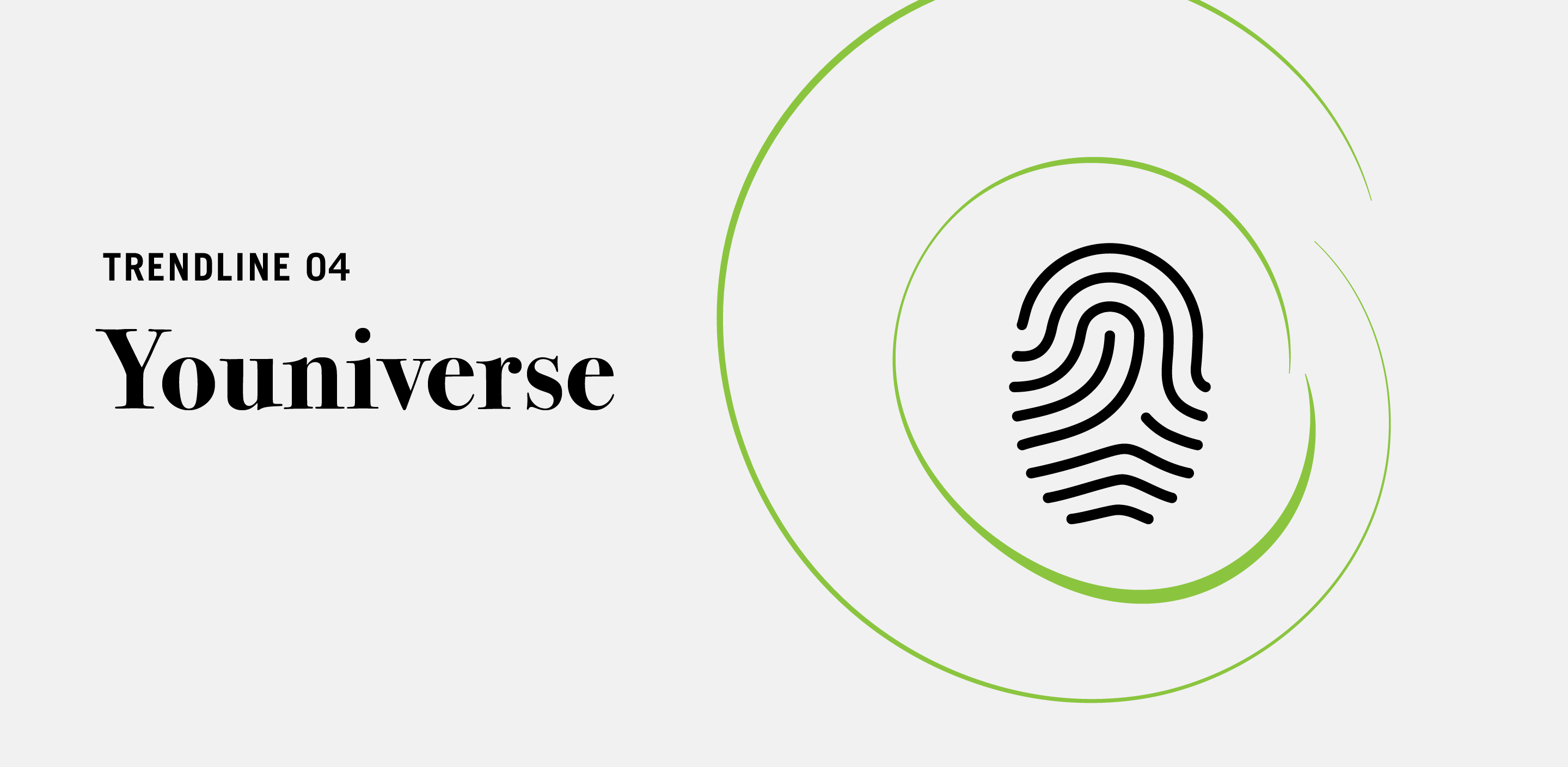Bi-Monthly Newsletter
Welcome to Trendline, a bi-monthly newsletter created in partnership between The Gettys Group Companies and TrendWatching. Here, we will examine TrendWatching’s global insights into numerous industries through the lens of hospitality, considering the possible implications and applications to our industry.
In each issue, we will focus on one of TrendWatching’s sixteen Mega-Trends—their comprehensive list of the ways in which human needs and expectations are changing while defining modern consumerism.

Issue 04 / Youniverse
In this issue, we’ll turn our attention to Youniverse—the individual’s desire to be seen and served based on their unique individuality.
In a consumer or guest’s personal “youniverse”, their individual preferences and tastes reign supreme. Their expectations have risen from a hope for to a demand for customized products, services and experiences. The questions that arise from this trend in the hospitality industry include:
-
How will hotels—which have traditionally been designed to serve the masses and appeal to the widest possible common denominator—incorporate new thinking to personalize offerings? How will they appeal to the individuality of each guest in environment, service and touch-points?
-
Brands like Amazon, Spotify and Netflix employ algorithms to better know and serve their customers, using past behavior to anticipate needs and preferences. How will the hotel industry better understand their guests’ behavior and anticipate their needs?
-
As guests increasingly choose one hotel over another based upon information they find online, how will hotels convey the personalization options that guests will enjoy once they arrive? How can they uncover the guests’ preferences while they’re still completing the purchase—and then act upon those preferences during their stay?
Sentient Spaces
Nike by Melrose: “Welcome to Nike by Melrose, our first neighborhood shop that combines our streamlined online experience with our most premium in-store service.”
TrendWatching’s 2019 Trend Report (available here) outlines how the Youniverse trend has evolved with technology over the past decade; where consumers once expected their data to factor into only their online behaviors, they now expect their data to follow them offline into Sentient Spaces that apply their data to real-world situations. As we look to other industries—retail, in particular—we can already find an abundance of environments that react to consumers’ buying habits and biometric data in order to cater to them as individuals.
In 2018, Nike by Melrose opened in Los Angeles, a bricks-and-motor store that creates a hyper-local experience for the community and individual alike by stocking more of the items that are most frequently ordered in the surrounding zip codes and by sending notifications to NikePlus members when they can get a first look at the new styles that match their past purchasing behavior.
2018 also saw India’s largest chain of cafés—Chai Point—start implementing facial recognition technology in its newest outlets, allowing members of their loyalty program to quickly complete transactions with a biometric scan.
Opening in 2019, Singapore’s Funan will be a mixed-use development where facial recognition will automatically direct residents to open parking spaces, allow guests access to a co-working space and even suggest retail options in the mall that might appeal based on the consumer’s age and gender.
Funan:“We are an experiential playground for the senses. Integrated with Grade-A offices and a serviced residence, Funan offers first-to-market technologies and retail concepts to deliver a dynamic array of learning and discovery experiences.”
Sentient Spaces is only one avenue leading from consumers’ desire for personalized offerings, but a rich one to explore further for the hospitality industry. Consider the implications of Youniverse coupled with another Mega-Trend, Infolust—the need for, and access to, relevant and actionable information. The Trendline authors believe that there is a lot to explore here. As we do, we had a chat with TrendWatching’s Max Luthy, Director of Trends & Insights to talk about it.
RILA & Accenture
Ron Swidler, The Gettys Group Companies: I read with interest and intrigue about Via Quatro’s subway system in São Paulo, Brazil; their subway train doors are equipped with face-scanning cameras, which then adjust the ads that run on the screens within the train cars. We wondered: in spite of the backlash against Facebook and mega-media/data businesses, how soon before we might see scanners installed at entry doors to hotels? This could lead to all types of “informed offerings” beyond advertisement, such as F&B, ambient music, TV content in public areas and more.
Max Luthy: Absolutely, we think it’s inevitable. In spite of of the fact that some states like yours (Illinois) have delayed adoption of facial recognition cameras in public spaces, there is overwhelming support for it. According to a report issued by the Retail Industry Leaders Association & Accenture in September, “63% of US consumers are interested in personalized recommendations, and 64% are willing to share data in exchange for personalized benefits such as automatic deals.” There is already a lot of data being collected by hotels that is likely not being used to the fullest benefit of the hotel or the consumer. And, there are numerous opportunities where hotels merely need to sync with the data and apps that the guest already has on their smartphone.
RS: You wrote a piece recently about the app, Timeshifter, that helps guests recover from jet lag by allowing them to create a personalized schedule for sleeping, eating, napping and caffeine intake. If that app could interface with the hotel guest room, we might see prompts appear on the TV reminding guests to go to sleep or order a cup of coffee from room service.
ML: Cool—there are so many more ways for the hotels to interact with their guests’ smart devices. Keyless door entry—probably the most publicized example of this—is really only the beginning.
Conclusion
We’ve seen a shift in consumer expectations around personalization; it may no longer surprise us that an app like Spotify can seemingly read our mind and build the perfect playlist for a current mood, but it still delights us.
In the hospitality industry, this expectation to be personally understood has led to increasingly high expectations around offerings and experiences that will be unique to each guest; this trajectory is set. What isn’t yet established for the hotel industry are the means of “reading and reacting”—whether this happens through face-scanning and AI, or frictionless interfaces that rely on consumers’ own devices.
What will be your response to the demand for personalization and spaces that deliver them?
For a complete list of Mega-Trends and more examples of trends being spotted around the world, please visit trendwatching.com.
Read the Previous Issue
Trendline Issue 03 / Ubitech
Technology is all around us promising to make life easier, faster and frictionless, and—in many cases—it’s fulfilling that promise.
As it increasingly senses us, anticipates our needs and serves us more efficiently and effectively than other humans are able to do, what is the role of automated commerce in hospitality?
Don't Miss an Issue of Trendline


